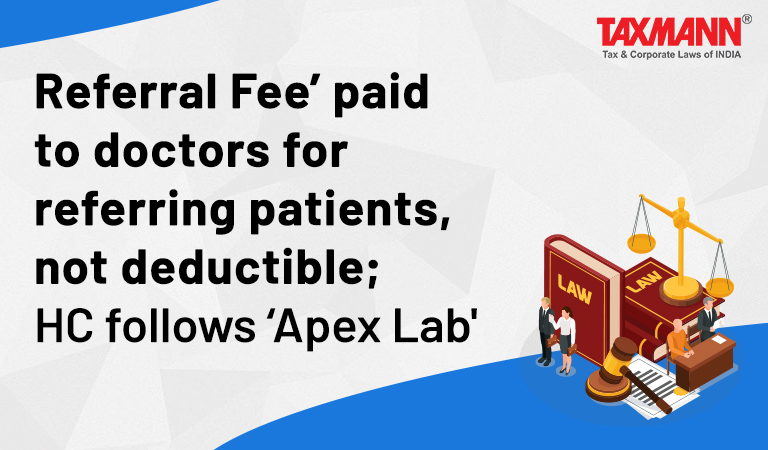‘Referral Fee’ paid to doctors for referring patients, not deductible; HC follows ‘Apex Lab’
- Blog|News|Income Tax|
- 2 Min Read
- By Taxmann
- |
- Last Updated on 24 April, 2022

Case Details: Peerless Hospitex Hospital and Research Centre Ltd. v. PCIT - [2022] 137 taxmann.com 359 (Calcutta)
Judiciary and Counsel Details
-
- Md. Nizamuddin, J.
- Abhijit Chatterjee, Sr. Adv. and Gopal Ram Sharma, Adv. for the Appellant.
- P.K. Bhowmick and Radhamohan Roy, Advs. for the Respondent.
Facts of the Case
Assessee-company is engaged in the business of running a multi-specialty hospital. A notice under section 148 was served on the assessee as it claimed ‘referral payment to doctors’ as a business expense. The assessee filed an objection against such notice and such objection was rejected by the AO.
AO opined that the aforesaid expenditure is prohibited by law and disallowable under section 37(1). The aggrieved assessee filed writ petition before the High Court.
High Court Held
The High Court held that the receiving of any freebies, bonus or commission, etc. by physician/medical practitioners from the allied health industry including hospitals for referring any patient by them for medical investigation, surgical, or other treatment purposes is prohibited under Regulation 6.4.1. and 6.4.2. of the Indian Medical Council (Professional Conduct, Etiquette and Ethics) Regulations, 2002, and violation of the same is a punishable offence and invites disciplinary action under Regulation 8 of said Indian Medical Council Regulations.
Further, the High Court followed the judgment of the Hon’ble Supreme Court in the case of Apex Laboratories (P.) Ltd. v. Deputy Commissioner of Income-tax LTU [2022] 135 taxmann.com 286 (SC) to held that allowing deduction of such expenses would encourage and cause proliferation of corruption in the medical field and will frustrate the very purpose and object of the aforesaid Indian Medical Council Regulations, 2002 and Explanation 1 of Section 37(1) of the Income Tax Act, 1961, and the CBDT’s Circular No. 5, dated 01-08-2012.
Disclaimer: The content/information published on the website is only for general information of the user and shall not be construed as legal advice. While the Taxmann has exercised reasonable efforts to ensure the veracity of information/content published, Taxmann shall be under no liability in any manner whatsoever for incorrect information, if any.

Taxmann Publications has a dedicated in-house Research & Editorial Team. This team consists of a team of Chartered Accountants, Company Secretaries, and Lawyers. This team works under the guidance and supervision of editor-in-chief Mr Rakesh Bhargava.
The Research and Editorial Team is responsible for developing reliable and accurate content for the readers. The team follows the six-sigma approach to achieve the benchmark of zero error in its publications and research platforms. The team ensures that the following publication guidelines are thoroughly followed while developing the content:
- The statutory material is obtained only from the authorized and reliable sources
- All the latest developments in the judicial and legislative fields are covered
- Prepare the analytical write-ups on current, controversial, and important issues to help the readers to understand the concept and its implications
- Every content published by Taxmann is complete, accurate and lucid
- All evidence-based statements are supported with proper reference to Section, Circular No., Notification No. or citations
- The golden rules of grammar, style and consistency are thoroughly followed
- Font and size that’s easy to read and remain consistent across all imprint and digital publications are applied



 CA | CS | CMA
CA | CS | CMA
